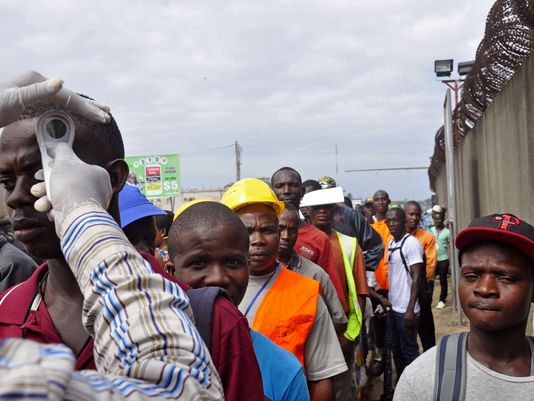A Spanish priest has received one of the world’s few doses of an experimental Ebola drug, raising ethical questions about how to allocate scarce medicines for a fatal disease at at time when the virus has infected at least 1,779 people in West Africa.

Workers have their temperature taken before entering the Freeport area, an important commercial port facility, in Monrovia, Liberia, on Aug. 11, 2014.
(Photo: Abbas Dulleh, AP)
The drug, ZMapp, is a mixture of three antibodies engineered to recognize Ebola and bind to infected cells so the immune system can kill them. It hasn’t yet been tested in humans.
ZMapp’s maker, Mapp Biopharmaceutical of San Diego, has said very little of the drug is currently available and that it is cooperating with government agencies to increase production as quickly as possible. The drug — made available on a compassionate use basis — also takes several months to produce, meaning that it will be months before any would be available in large amounts. Anthony Fauci, director of the National Institute of Allergy and Infectious Diseases, has publicly said that he knows of only three or four doses.
Two American aid workers, who were infected with Ebola and flown from Africa to a special unit at Emory University Hospital in Atlanta, also have received doses.
Contrary to what many people believe, the ultimate decision for who gets an experimental drug is made by the manufacturer, not the government, says Arthur Caplan, head of the division of medical ethics at New York University’s Langone Medical Center. Companies have drastically different policies for making unapproved drugs available, he says.
The World Health Organization scheduled a special meeting Monday to discuss how to ration scarce doses of the drug, and is expected to release a statement Tuesday. There are currently no proven medications or vaccines to treat Ebola, which has killed at least 961 people, although several therapies are in development.
The fact that three Westerners have received ZMapp has led some to criticize the manufacturer of being biased toward Americans or whites, when so many black Africans are dying. Nigerian officials say they had asked U.S. health authorities about getting the Ebola drug but were apparently not helped.
There’s no reason to try this medicine on sick white people and to ignore blacks, said Marcel Guilavogui, a pharmacist in Conakry, Guinea. We understand that it’s a drug that’s being tested for the first time and that could have negative side effects. But we have to try it in blacks too.
Last week, Anthony Kamara, a 27-year-old man riding a bicycle in Freetown, Sierra Leone, said Americans are very selfish. They only care about the lives of themselves and no one else.
He referred to ZMapp as the miracle serum that the U.S. has refused to share with us to save African lives.
Caplan says he didn’t question the decision to give the drugs to physician Kent Brantly and missionary Nancy Writebol. That’s because the humanitarian agencies who sent them to Africa were apparently the first to ask for the drug, Caplan says.
Brantly and Writebol also were essential first-responders, who traditionally are treated first in outbreaks, says G. Kevin Donovan, director of the Pellegrino Center for Clinical Bioethics at Georgetown University Medical Center in Washington, D.C.. Both Brantly and Writebol put their lives on the line to help others, and first-responders need to stay healthy to treat the sick, Donovan says.
Few doctors, nurses or even orderlies and funeral directors will volunteer to treat infected people if they think they will be last in line for treatment, Caplan says. He notes that 80 health workers have died from Ebola since the outbreak began in March. Caplan says it’s also critical to choose patients who can be followed not just for few days, but for months or years, to learn whether the treatments damage the liver or produce other side effects that can take time to appear. With drugs that are so new and experimental, doctors have an obligation to learn from every patient, he says. If it damages your liver and causes it to shut down three months from now, that is not a cure, Caplan says.
But Caplan says it’s morally troubling to give the drug to someone like the Spanish priest, who is not a health care professional and who is 75 years old. Older people have notoriously weak immune systems, Caplan says, so the drug may not work as well on him as in a younger person. He also may be in weaker health so it could be unclear whether any health problems that he experiences stem from the drug, or his advanced age.
Donovan argues that the Spanish priest, Miguel Pajares, was putting his life on the line, as well, even if he wasn’t providing medical treatment, simply by trying to help Ebola victims. Donovan says he’s troubled by the fact that Ebola and other diseases that primarily afflict developing countries have been ignored for so long.
Given that we’ve known about Ebola since the 1970s, why has it taken so long to develop an appropriate response? Donovan asks. There just really wasn’t enough interest from those who could be supporting drug development.





